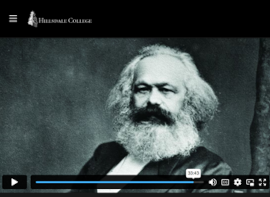Hillsdale College’s free online course, “Marxism, Socialism, and Communism,” consists of six videos with quizzes, optional reading, and study guides. The course explores Marxism from its origins to the present day through videos that run about 30 to 40 minutes each. (DVDs are available for a donation.) Several presenters provide voice-overs for the lessons which are presented with historical film footage, photographs, paintings, and quotes from pertinent authors and speakers.
The lessons are titled:
- The Journalist: Marx
- The Revolutionary: Lenin
- The Dictator: Stalin
- The Critics: Solzhenitsyn, Mises, and Hayek
- The Acolytes: Yugoslavia and China
- The Utopians: Cultural Marxism
A quiz with five multiple-choice questions follows each video. The course ends with a 15-question final exam. The quizzes and exam are scored immediately and show correct and incorrect responses. Students can retake them if they wish.
Each lesson has a downloadable study guide, two to four pages in length, that summarizes key points of the lesson and provides three discussion questions and space for students to write notes. Beneath the study guide are links to excerpts from other resources, such as The Communist Manifesto, two of Lenin’s speeches, and speeches by Mao Zedong and Deng Xiaoping, plus excerpts from several books: The Gulag Archipelago by Solzhenitsyn, Stalin’s War by McMeekin, The Russian Revolution by McMeekin, Socialism by Mises, The Road to Serfdom by Hayek, and War on the American Republic by Slack.
The excerpts provide valuable support for the lessons, but reading them isn’t required to pass the quizzes. For those who want to go deeper, the six books listed above are available through Hillsdale, individually or as a set.
Access to a discussion board is included. It appears to have lots of interaction and might interest some students.
Course Content
The first lesson tells the background of Karl Marx and his writing in Das Kapital that presented a comprehensive theory of the intersection of history and economics. It also discusses his collaboration with Friedrich Engels on The Communist Manifesto, which was published widely in many languages. The lesson explains that many nineteenth-century countries had moved away from faith and toward reliance on science and industrialization. Consequently, their societies were becoming more clearly split between the owners of capital and workers, resulting in huge social strife. They were ripe for revolution.
Marx was hugely influential in that period, being called the Father of Socialism and even depicted in a political cartoon as presenting the Communist Manifesto on tablets mimicking those of the Ten Commandments. Among key ideas he promoted were the abolition of the family, religion, and private property. Unexpectedly, Marxism was adopted more readily by intellectual elites than the working class, which was its intended audience.
The second lesson focuses on Lenin and his determination to install Marxism in Russia and, eventually, around the world. The destruction and death under Lenin were just the beginning of the downward spiral.
Next, Stalin developed five-year plans and solidified control over the country. While he created more structure for the country and the economy, it only worked through ruthless control, resulting in repression, show trials, executions, famine, and death.
WWII served Stalin by destroying both resources and residents of capitalist countries, positioning the Soviet Union to claim control of many countries after the war. The spreading control of the Soviet regime resulted in the beginning of the Cold War and Soviet support for the rise of Communist China.
Critics such as Alexander Solzhenitsyn alerted the world to the evils of the Soviet Union, especially as it played out in the gulags. Critiquing communism from another perspective, economists such as Ludwig von Mises and Friedrich Hayek explained why the collapse of communist systems was inevitable.
After the fall of the Soviet Empire, Marxism retreated to universities and the intelligentsia, with its most recent iteration appearing under the guise of critical theory. Today’s cultural Marxism extends beyond economics and government to all areas of life, and socialism and progressivism are seen as more practical avenues for achieving communist goals.
The course presenters recognize that real problems arising from capitalism have given rise to competing ideologies like socialism and communism. The 2008 crash exposed some of those problems and created a climate that encouraged belief in ideas like democratic socialism in the U.S., especially among young people. The increasing wealth disparity between the very rich and the shrinking middle class has only exacerbated the problem.
To address such issues, the course returns to the ideas of our Founding Fathers, pointing to the principles that formed our country, ideas based on the morality of the people and a desire for unity rather than breakdown into competing factions. They conclude by stating that liberty rather than government control is the only solution. Even so, the focus of the course is on the history of Marxism, and it does not present an extensive defense of capitalism.
Summary
"Marxism, Socialism, and Communism" is packed with information and ideas students should know, and the presentation is excellent. The course is best for students who have studied or are studying world history in high school. Since it’s a short course, it could be used as a supplement to a history, economics, or government course. Ideally, students will watch the videos, maybe read some of the supplemental material, and then meet with other students or a parent for a discussion of the questions.









